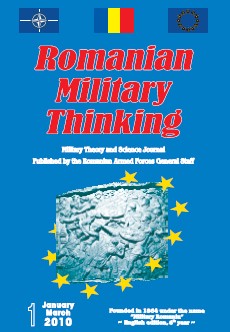THE GENERAL STAFF AND ROMANIA’S STAND ON THE DISARMAMENT ISSUE IN THE INTERWAR PERIOD
THE GENERAL STAFF AND ROMANIA’S STAND ON THE DISARMAMENT ISSUE IN THE INTERWAR PERIOD
Author(s): Luminiţa GiurgiuSubject(s): Security and defense, Military policy, Peace and Conflict Studies
Published by: Centrul tehnic-editorial al armatei
Keywords: budget deficit; national defence; war industry; Great General Staff; international engagements;
Summary/Abstract: During the Disarmament Conference, held in six sessions, between 1926 and 1930, the debate focused on two theses. Thus, the French thesis meant reducing armaments to provide states security and advocated a rigorous control of armaments and arms limitation to the degree to which acts of aggression committed by surprise would not be possible, also setting an appropriate ratio between land, naval and air disarmament. On the other hand, as the author points out, the English thesis assumed that the term “military potential” was too complex to be taken into accout and rejected international control, because it would have triggered “susceptibility” on the part of some states, agreeing to reduce or limit a country’s armed forces that were “available at the time of the mobilisation”.
Journal: Romanian Military Thinking
- Issue Year: 2010
- Issue No: 1
- Page Range: 181-185
- Page Count: 5
- Language: English

